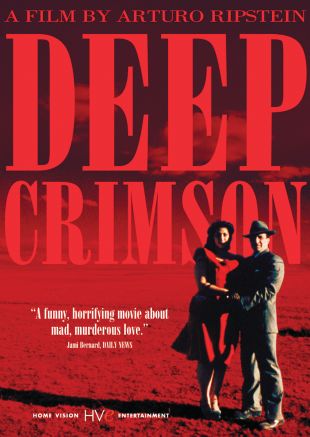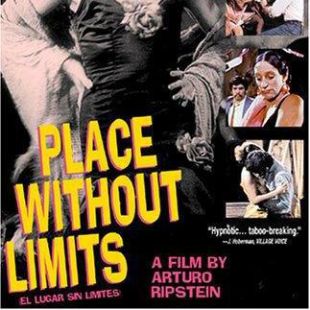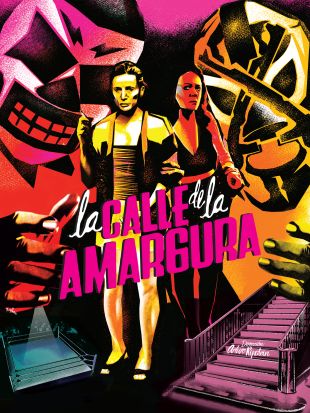Widely considered Mexico's most celebrated and respected contemporary filmmaker, as well as perhaps the only director to have truly inherited Luis Buñuel's mantle, Arturo Ripstein is a legend in his own right. His films have earned both fame and infamy for taking melodrama to its macabre extremes, and they reflect the director's fascination -- one shared by Buñuel -- with l'amour fou and claustrophobia. Although his films have been enthusiastically received outside of Mexico in France and Spain, Ripstein is largely unknown to American audiences, an oversight that is unfortunate at the very least.
Born in Mexico City on December 13, 1945, Ripstein was the son of producer Alfredo Ripstein, Jr. Growing up on the sets of his father's films, he became infatuated with the idea of becoming a filmmaker at a very young age. He began his professional career at the age of 19 as the (unbilled) assistant director to Buñuel on El Ángel Exterminador (1962). This working relationship gave rise to a close personal friendship that continued until Buñuel's death, and although Ripstein has claimed that he learned very little from working with the master director (because, he once stated in an interview, Buñuel was "perfect"), the latter's influences on his films are unmistakable.
Ripstein made his directorial and screenwriting debut in 1965 with Tiempo De Morir (Time to Die). A story of murder and revenge, it explored many of the themes that the director would make the trademarks of his brand of "macabre melodrama" in the years to come. The film's script was written by Carlos Fuentes and Nobel Prize winner Gabriel García Márquez; Ripstein would subsequently collaborate with a number of important Latin American writers, including Joss Emilio Pancheco (El Castillo De La Pureza (The Castle of Purity), 1974, and El Santo Oficio (Holy Office), 1974); José Donoso (El Lugar Sin Limites (Hell Has No Limits), 1977); Vincente Leñero (La Tía Alejandra (Aunt Alexandra), 1978); and Luis Spota (Cadena Perpetua (In For Life), 1978).
During the '70s, Ripstein garnered increasing recognition for his films, particularly El Santo Oficio, which was shown in competition at the 1974 Cannes Festival. An account of the sufferings of a Jewish family forced to flee to Mexico during the Spanish Inquisition, it drew on Ripstein's own Jewish heritage and provided a stark exploration of the claustrophobia of oppressive secrets and assumed identity.
Due to a lack of funding for his films, Ripstein occasionally made commissioned movies, such as La Ilegal (The Illegal Woman, 1979). Produced by Televicine, the filial company of the Mexican media conglomerate Televisa, it starred one of Mexico's biggest starlets at the time, Lucia Méndez as an illegal Mexican immigrant in the United States.
Such commissioned films were thankfully the exception to the norm rather than the norm itself, and Ripstein continued to do his best work on an independent level. After directing Imperio De La Fortuna (The Realm of Fortune, 1987), which was based on a text by Juan Rolfo, he began working with his wife Paz Alicia Garciadiego, a collaboration that produced some of Ripstein's most celebrated films. Of his work with screenwriter Garciadiego, the director once quipped that she, as a Catholic, introduces sin to their scripts, whereas he, as a Jew, provides the guilt.
One of Ripstein's more acclaimed efforts with Garciadiego was Principio y Fin (The Beginning and the End, 1994). Based upon the novel by Nobel Prize-winning Egyptian author Naguib Mahfouz, the film traced the disintegration of a family following the sudden death of the father. It won the San Sebastian Film Festival's Gold Shell award; that same year, Ripstein's La Reina De La Noche (The Queen of the Night, 1994) was shown in competition at Cannes. A fictionalized biography of legendary Mexican singer Lucha Reyes, it was melodrama at its most effective, combining beauty and tragedy with the authority of real-life occurrences.
Profundo Carmesí (Deep Crimson, 1996), was Ripstein's most celebrated work to date. Based upon the real-life "Lonely Hearts Murders" that took place in Mexico during the late 1940s, it was perhaps Ripstein's most full-bodied and successful exploration of l'amour fou. Of this brand of crazy love that takes place between the film's main characters, a badly aging gigolo and an excessively overweight nurse with halitosis, Ripstein stated "There's nothing like mad love: it shatters, corrupts, transforms...Nothing like mad love to break, tear down, and undo the house of social order. Nothing is more flippant, sacrilegious, or heretic. Nothing more human." The film won a number of awards at the Venice Film Festival and earned a Special Mention in Latin American Cinema at that year's Sundance Festival.
In 1997, Ripstein was awarded the National Prize for the Arts in Mexico, becoming the only filmmaker aside from Buñuel to have received the honor. That same year, he began working on a new film, El Evangelio De Las Maravillas (Divine), 1998). Based on actual events that took place in Mexico during the 1970s, it was a comedy-drama about a religious cult. The film was screened at Cannes. The following year, Ripstein's El Coronel No Tiene Quien Le Escriba (No One Writes to the Colonel was also screened in competition at the festival. Based on García Márquez's novel, it was another study of a character trapped in a fatal destiny, driven into a hopeless void by his needy supplication to mere illusion.


